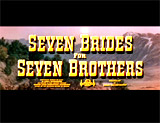
|
Seven Brides for Seven Brothers
(1954)
In one of the greatest, most successful and most exuberant
dance musicals from MGM in the 50s, from director Stanley Donen;
the musical was derived from a Stephen Vincent Benet short story
titled The
Sobbin' Women; the film featured many incredibly dynamic
dancing scenes (choreographed by Michael Kidd although shot entirely
on a sound stage), and an Oscar-winning
Musical Score (by Saul Chaplin and Adolph Deutsch), with great Gene
de Paul/Johnny Mercer songs in the score; other nominations included
Best Picture, Best Color Cinematography,
Best Film Editing, and Best Adapted Screenplay:
- set in the 1850s in the Oregon Territory, the musical
told about the six unmarried brothers of Adam Pontipee (Howard
Keel) - an Oregon farmer (the eldest of seven brothers), who abducted
maidens from town for purposes of marriage
- in the early scenes, Adam journeyed
to town to buy winter supplies (corn, farm equipment, etc.), and
spotted the beautiful, hard-working Milly (Jane Powell), who was
chopping wood and serving home-made stew to customers at a local
boarding house; he sang Bless Your Beautiful Hide and decided that they would get married since she would make a great cook and house-keeper
- on the way back to the remote
Pontipee farm, she joyfully sang Wonderful, Wonderful
Day about her married future with him - not knowing that she
would be caring for six younger, rough lumberjacking brothers as
well; after meeting Adam's six unmarried, unruly and rambunctuous
brothers and their unkempt house, Milly realized that Adam had
married her for her maid and servant skills; Milly took it upon
herself to civilize the brothers (with lessons on wearing underwear
and shaving), as she sang
Goin' Courtin' with a polka tune, she taught
the boys about the etiquette of courting women
- about a month later came
the film's highlight - a lively and large-scale dance number -
a sensational, 8-minute barn-raising dance sequence in the local
town. It began with a competitive challenge dance of gymnastic,
acrobatic leaps and balletic steps (between the local suitors in
town and the Pontipees); each
of the brothers showed off on a single or double narrow plank
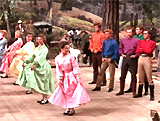
"Barn-Raising" Ballet Sequence
|
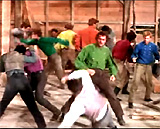
Rowdy Fist-Fighting Brawl
|
Throughout the film, the brothers (with names from
A to G) were identified by different colored shirts, while paired
up with six women (they also wore different colored dresses in the
'barn-dance' sequence).
- Adam (light green)
- Benjamin (orange) - Jeff Richards
- Caleb (yellow) - Matt Mattox
- Daniel (mauve) - Marc Platt
- Ephraim (dark green) - Jacques d'Amboise
- Frank (red) - Tommy Rall
- Gideon (blue) - Russ Tamblyn
|
- Milly
- Dorcas Gaylen (purple) - Julie Newmar (Newmeyer)
- Ruth Jepson (blue) - Ruta Lee (Kilmonis)
- Martha (light green) - Norma Doggett
- Liza (pink) - Virginia Gibson
- Sarah Kine (light yellow) - Betty Carr
- Alice Elcott (peach) - Nancy Kilgas
|
- the barn-raising was followed by a choreographed,
rowdy fist-fighting brawl between the brothers and other jealous
suitors in the local town who were all vying for the attention
of the young women
- after the brawling fight in town and the approach
of winter, during chore-time, the lovesick brothers lamented their
situation by singing a lovesick song Lament (I'm a Lonesome Polecat),
and pining for female companionship, while chopping wood (with rhythmic
axe blows and saw strokes)
- Adam came up with a dubious plan for the brothers,
based on Plutarch's ancient Roman legend (Life of Romulus)
of the Rape of the Sabine Women. He
lustfully sang Sobbin' Women. The brothers went
to town to kidnap the women, then brought them home, and as they
were pursued, a snowslide on a mountain pass blocked the road behind
them. They were saved, but the six females were also trapped for
the winter
- when Milly discovered what
had happened, she banished the brothers to sleep in the barn for
the winter and prohibited any more courting; Adam was also a target
of Milly's furious wrath and he was forced to leave for the mountains
and exiled for the winter in his hunting cabin
- with the arrival of spring, the women were now wishing
to pursue romance reunite with the men, and get married
after a long winter, and they sang June
Bride in their white underthings. Meanwhile, Milly gave birth
to a baby girl in the spring
- Adam returned and made up with Milly, and helped
to care for their newborn child Hannah. He was also ready to announce
that the women would be returned to their families, but the plan
was opposed by the brothers - and the women who wanted to stay
- they ran off to protest returning to the town
- at the same time, the fathers
of the abducted women and their angry suitors arrived, caused a
fracas, and threatened to hang the brothers. However, the sounds
of Hannah's crying prompted all of the females to simultaneously
claim that the baby was theirs ("Mine!")
- the Reverend Elcott (Ian Wolfe), Alice's father,
conducted a six-way shot-gun wedding ceremony. The film concluded with Spring,
Spring, Spring, a sweethearts' song sung by the brothers
and their new brides, in various springtime settings for each of the
courting couples
|

Adam Pontipee (Howard Keel) Singing "Bless Your Beautiful
Hide"

Milly (Jane Powell) Singing "Wonderful, Wonderful
Day"
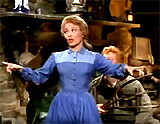
"Goin' Courtin'" - Lessons from Milly on Courting
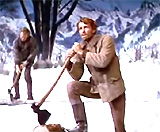
"Lament (I'm a Lonesome Polecat)"
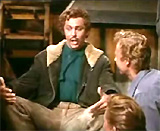
"Sobbin' Women" - Adam's Solution - Kidnap
the Females in Town
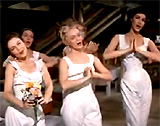
The Kidnapped Women Singing "June Bride"
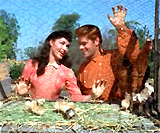
"Spring, Spring, Spring" - a Courting Song
|








